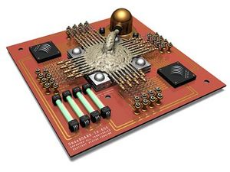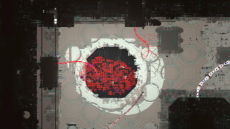Biocomputers (https://en.m.wikipedia.org/wiki/Biological_computing) are an emergency technology where biological components are made to store and/or process information for computers. Biocomputers have been made in the past using brain cells (https://www.newscientist.com/article/dn6573-brain-cells-in-a-dish-fly-fighter-plane/) however keeping brain cells alive is both difficult and expensive. Other approaches are currently being tried using fungi and bacteria. (https://www.technologyreview.com/2021/11/09/1039107/e-coli-maze-solving-biocomputer/ https://www.cnet.com/science/pianist-to-perform-musical-duet-with-slime-mold/). There are also approaches in synthetic biology that would use individual biological molecules for computing. (https://en.m.wikipedia.org/wiki/DNA_computing https://en.m.wikipedia.org/wiki/Peptide_computing https://en.m.wikipedia.org/wiki/Transcriptor)
So my question to you /cyb/ is how will these devices change the world of computing?
/cyb/ - Cyberpunk Fiction and Fact
Cyberpunk is the idea that technology will condemn us to a future of totalitarian nightmares here you can discuss recent events and how technology has been used to facilitate greater control by the elites, or works of fiction
61 replies | 8 files | 27 UUIDs | Page 2
11 replies and 2 files omitted.
>>2205
>Suffering is a conscious experience. If it isn't conscious, it can't suffer.
You can suffer in your sleep, during a nightmare. Organisms with neither intelligence nor self awareness are still capable of feeling pain and stress.
>Suffering is a conscious experience. If it isn't conscious, it can't suffer.
You can suffer in your sleep, during a nightmare. Organisms with neither intelligence nor self awareness are still capable of feeling pain and stress.
Anonymous
No.2208
>>2207
Dreams are complicated. I guess you aren't conscious in the traditional sense. The key word is awareness. Since you still have awareness to the stimuli in the dream, it shouldn't be considered a complete loss of conciousness as per this definition.
>Organisms with neither intelligence nor self awareness are still capable of feeling pain and stress.
Without awareness, pain is no different to the sensors in a machine telling it to protect its expensive components.
And stress is little more than a chemical adjustment to the given situation.
Our perception of pain and stress is literally shaped by our conscious experiences.
Dreams are complicated. I guess you aren't conscious in the traditional sense. The key word is awareness. Since you still have awareness to the stimuli in the dream, it shouldn't be considered a complete loss of conciousness as per this definition.
>Organisms with neither intelligence nor self awareness are still capable of feeling pain and stress.
Without awareness, pain is no different to the sensors in a machine telling it to protect its expensive components.
And stress is little more than a chemical adjustment to the given situation.
Our perception of pain and stress is literally shaped by our conscious experiences.
>>2209
Idk, people aren't always aware of anything while they're in comas, but people also sometimes wake up from comas that they've been in decades. I don't think your soul should leave your body because of loss of awareness or consciousness.
That's getting into the esoteric metaphysics of afterlives/souls though. It's not really knowable or probable using logic or science, so discussing when/how it happens is an exercise in futility.
Idk, people aren't always aware of anything while they're in comas, but people also sometimes wake up from comas that they've been in decades. I don't think your soul should leave your body because of loss of awareness or consciousness.
That's getting into the esoteric metaphysics of afterlives/souls though. It's not really knowable or probable using logic or science, so discussing when/how it happens is an exercise in futility.
>>2210
>Idk, people aren't always aware of anything while they're in comas, but people also sometimes wake up from comas that they've been in decades.
Which means it wasn't a permanent loss of consciousness.
Should I mention how these implications line up perfectly with the bible?
I mean, issues like the long comas you mentioned. Or technology being able to "resurrect" people after they've been dead for a long time. Are not really that important, because everyone will only join the otherworld until judgement day.
The precise moment in which your soul leaves your body is* irrelevant.
>Idk, people aren't always aware of anything while they're in comas, but people also sometimes wake up from comas that they've been in decades.
Which means it wasn't a permanent loss of consciousness.
Should I mention how these implications line up perfectly with the bible?
I mean, issues like the long comas you mentioned. Or technology being able to "resurrect" people after they've been dead for a long time. Are not really that important, because everyone will only join the otherworld until judgement day.
The precise moment in which your soul leaves your body is* irrelevant.
Anonymous
No.2213
On that note. I doubt any pagan religion stands its ground as firmly on this.
Technology will put religion to the test. And the false gods will be trampled one by one.
Technology will put religion to the test. And the false gods will be trampled one by one.
>>2212
>Which means it wasn't a permanent loss of consciousness.
Yeah, but how can you tell something is "permanent" when people go on for literal decades with little or no brain activity, and then just wake up like nothing happened? You wouldn't be able to tell if it's really permanent until they died and their brain matter were incinerated.
>The precise moment in which your soul leaves your body is* irrelevant.
The question was when your soul leaves your body, not the relevance of it; it wouldn't change that you might spend decades in a computer-simulated nightmare. I see your point though.
Anyway, this is getting a little off-topic, so let's not shit-up OP's biocomputer thread, but if you have anything more to say about souls I'd gladly read all about it on a >>>/vx/ thread.
>Which means it wasn't a permanent loss of consciousness.
Yeah, but how can you tell something is "permanent" when people go on for literal decades with little or no brain activity, and then just wake up like nothing happened? You wouldn't be able to tell if it's really permanent until they died and their brain matter were incinerated.
>The precise moment in which your soul leaves your body is* irrelevant.
The question was when your soul leaves your body, not the relevance of it; it wouldn't change that you might spend decades in a computer-simulated nightmare. I see your point though.
Anyway, this is getting a little off-topic, so let's not shit-up OP's biocomputer thread, but if you have anything more to say about souls I'd gladly read all about it on a >>>/vx/ thread.
We have or will have quantum computers. We have or rather we will have biocomputers. The question is whether a quantum computer and a biocomputer can be combined, creating a quatinc biocomputer. What would it be like?
>>2226
I think we will have both for different applications, but mostly biocomputers. Biocomputers are much cheaper than quantum computers.
I think we will have both for different applications, but mostly biocomputers. Biocomputers are much cheaper than quantum computers.
>>2229
Yes, but I was talking about combining biocomputers with quantum computers.
>Biocomputers are much cheaper than quantum computers.
Possibly, but they are not (are) more ethical.
Yes, but I was talking about combining biocomputers with quantum computers.
>Biocomputers are much cheaper than quantum computers.
Possibly, but they are not (are) more ethical.
Anonymous
No.2232
>>2231
I think it would depend on the application. I think using them as sensors and the like would be considerably more ethical than using them as processors.
I think it would depend on the application. I think using them as sensors and the like would be considerably more ethical than using them as processors.
>engineers
Investors are infinitely more important than some nerds. Quantum computers, and specially biocomputers are not attractive enough, at least for now.
Investors are infinitely more important than some nerds. Quantum computers, and specially biocomputers are not attractive enough, at least for now.
Anonymous
No.2243
>>2240
Basically this.
While quantum computing and bio computing could potentially have an important industrial/scientific application, there's little evidence for it being commercially profitable enough to get investors.
Basically this.
While quantum computing and bio computing could potentially have an important industrial/scientific application, there's little evidence for it being commercially profitable enough to get investors.
Anonymous
No.2267
>>2240
Biocomputers might start to look like an attractive option when supply chains start to collapse or if China shuts off access to rare earth minerals.
Biocomputers might start to look like an attractive option when supply chains start to collapse or if China shuts off access to rare earth minerals.
Could biocomputers be made from lesser forms of life, such as dolphin brain cells or nigger brain cells?
Anonymous
No.2270
>>2268
>>2269
They've already been made using human brains cells.
https://www.ign.com/articles/pong-human-brain-cells-faster-learn-ai
>>2269
They've already been made using human brains cells.
https://www.ign.com/articles/pong-human-brain-cells-faster-learn-ai
Anonymous
No.2271
>>2269
Also not sure a flight simulator should be classified as "basic" these things have a lot of potential.
Also not sure a flight simulator should be classified as "basic" these things have a lot of potential.
Remember the AI that made Halicin?
Bet an AI made of human or negroid or dolphim/rat brain cells could make something better than Halicin.
Bet an AI made of human or negroid or dolphim/rat brain cells could make something better than Halicin.
In Rain World there are colossal supercomputers that run their processing power off "microbes," presumably bacteria. The issue with doing this is not only heat management but ensuring that these microorganisms get enough water. Also, if they get sick or mutate that could open up a host of other issues as well.
>>2284
>>2286
Phages (viruses) and Bacteria engage in co-evolution. Bacteria constantly modify their defenses in response to phages. Phages then adapt to these new defenses and so on.
Not unlike software when you think about it.
https://www.nature.com/articles/nrmicro2315
>>2286
Phages (viruses) and Bacteria engage in co-evolution. Bacteria constantly modify their defenses in response to phages. Phages then adapt to these new defenses and so on.
Not unlike software when you think about it.
https://www.nature.com/articles/nrmicro2315
>>2284
I know that bacteria have been used in biocomputers before. Geobacter sulfurreducens is a real good candidate for a computer like that.
I know that bacteria have been used in biocomputers before. Geobacter sulfurreducens is a real good candidate for a computer like that.
Anonymous
No.2310
>>2290
Apparently they've already been used to make a rudimentary biocomputer.
https://www.seantross.com/transmitting-nature
Apparently they've already been used to make a rudimentary biocomputer.
https://www.seantross.com/transmitting-nature
Anonymous
No.2314
>>2289
So you're talking about a "(Co-)evolution" of a machine(AI) and microbe creating a Cyborg "naturally"?
So you're talking about a "(Co-)evolution" of a machine(AI) and microbe creating a Cyborg "naturally"?
Anonymous
No.2323
>>2322
Not really. One way in which software "evolves", is through the search of vulnerabilities, as they are discovered and then subsequently patched.
Phages explore vulnerabilities and device workarounds to kill bacteria. Bacteria adapt developing new defenses. All through natural selection of course.
Not really. One way in which software "evolves", is through the search of vulnerabilities, as they are discovered and then subsequently patched.
Phages explore vulnerabilities and device workarounds to kill bacteria. Bacteria adapt developing new defenses. All through natural selection of course.
Anonymous
No.2324
>Inside the lab that’s growing mushroom computers
>The lead researcher says he is “planning to make a brain from mushrooms.”
https://www.popsci.com/technology/unconventional-computing-lab-mushroom/
>The lead researcher says he is “planning to make a brain from mushrooms.”
https://www.popsci.com/technology/unconventional-computing-lab-mushroom/
>>2493
>“planning to make a brain from mushrooms.”
Amazing the stupidity of that research.
Computers are meant to be lighting fast, no organic material can match silicon stuff, not even in dreams.
>“planning to make a brain from mushrooms.”
Amazing the stupidity of that research.
Computers are meant to be lighting fast, no organic material can match silicon stuff, not even in dreams.
>>2493
Imagine this technology being abused to mine bitcoin using the mycelium of the biggest forests of the world
Imagine this technology being abused to mine bitcoin using the mycelium of the biggest forests of the world
>>2495
>Imagine this technology being abused to mine bitcoin
Yeah, a quatrillion year needed to mine just one.
>Imagine this technology being abused to mine bitcoin
Yeah, a quatrillion year needed to mine just one.
Anonymous
No.2500
>>2498
No way fag.
Look at the size of a forest with mushrooms.
Look at the size of a bitcoin mining rig.
Scale up to match the forest.
No way fag.
Look at the size of a forest with mushrooms.
Look at the size of a bitcoin mining rig.
Scale up to match the forest.
>>2494
The human brain is both more powerful than any computer on the planet and consumes less energy. Organic material absolutely has the potential to out-compute silicon transistors.
The human brain is both more powerful than any computer on the planet and consumes less energy. Organic material absolutely has the potential to out-compute silicon transistors.
https://www.advancedsciencenews.com/a-computing-system-made-from-heart-cells/
This is the third biocomputer this year to make headlines. Seems there is a lot of interest in biocompting right now.
This is the third biocomputer this year to make headlines. Seems there is a lot of interest in biocompting right now.
>>2548
>“Next steps will be to improve the programmability of our biocomputer, so that we can solve multiple problems on one device,” added Zorlutuna.
What a shameless grifter and con man.
>“Next steps will be to improve the programmability of our biocomputer, so that we can solve multiple problems on one device,” added Zorlutuna.
What a shameless grifter and con man.
>>2551
An electro-chemical reaction is not a computer and tweaking that reaction is not the software.
That cretin is using the 'computer' label while calling his contact in the judenpresse to facilitate more shekels and a steady incoming.
An electro-chemical reaction is not a computer and tweaking that reaction is not the software.
That cretin is using the 'computer' label while calling his contact in the judenpresse to facilitate more shekels and a steady incoming.
Anonymous
No.2554
>>2553
>it is a form of computing
A forced analogy (a form of computing you said) doesn't turn one into another.
>it is a form of computing
A forced analogy (a form of computing you said) doesn't turn one into another.
Anonymous
No.3697
Biocomputing is really starting to take off.
https://m.youtube.com/watch?v=txtDpCLHUkU
https://www.microsoft.com/en-us/research/project/dna-storage/
Fun fact in the original script of the matrix the humans were used as processors not batteries, but the studio thought that audiences wouldn't get it.
https://m.youtube.com/watch?v=txtDpCLHUkU
https://www.microsoft.com/en-us/research/project/dna-storage/
Fun fact in the original script of the matrix the humans were used as processors not batteries, but the studio thought that audiences wouldn't get it.
11 replies and 2 files omitted.
[View All] [Last 100 Posts] [Last 200 Posts]Post pagination: [Prev] [1-50] [51-61] [Next]
61 replies | 8 files | 27 UUIDs | Page 2




